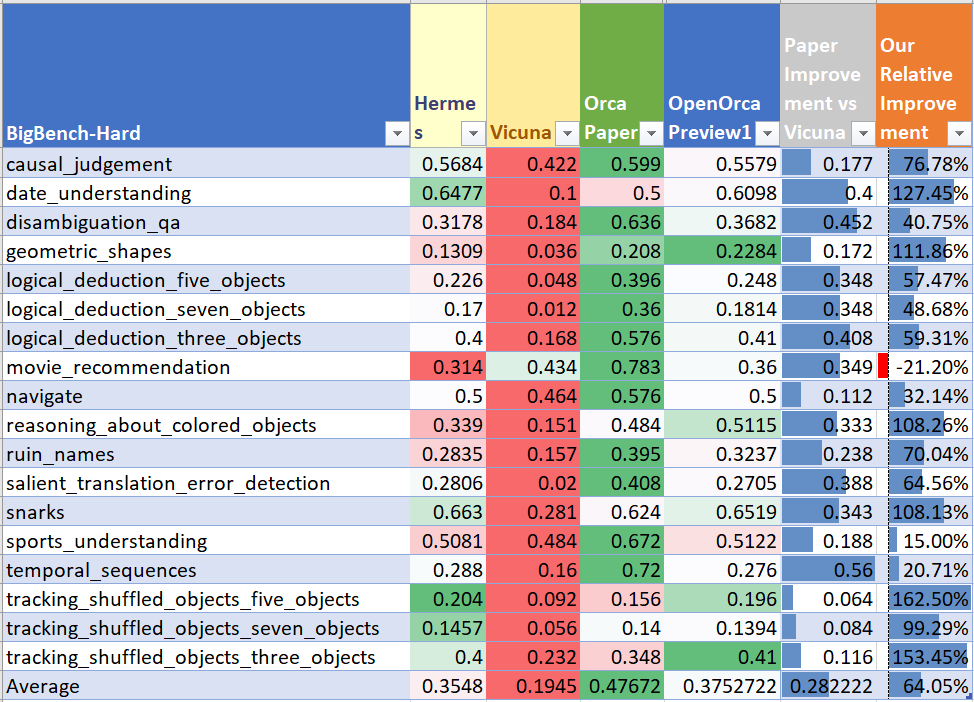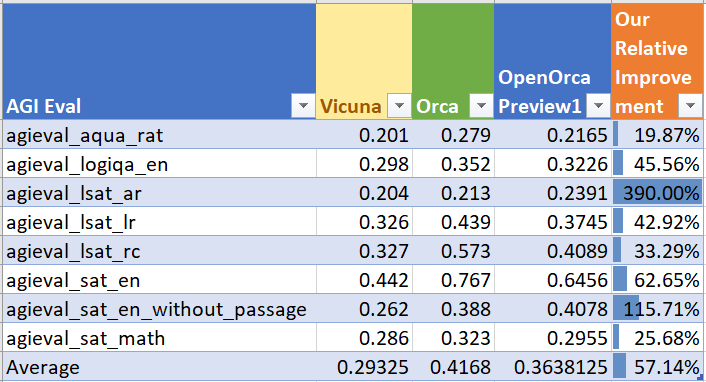datasets:
- Open-Orca/OpenOrca
inference: false
language:
- en
library_name: transformers
license: other
model_type: llama
pipeline_tag: text-generation

Open-Orca's OpenOrca-Preview1-13B GGML
These files are GGML format model files for Open-Orca's OpenOrca-Preview1-13B.
GGML files are for CPU + GPU inference using llama.cpp and libraries and UIs which support this format, such as:
- KoboldCpp, a powerful GGML web UI with full GPU acceleration out of the box. Especially good for story telling.
- LoLLMS Web UI, a great web UI with GPU acceleration via the c_transformers backend.
- LM Studio, a fully featured local GUI. Supports full GPU accel on macOS. Also supports Windows, without GPU accel.
- text-generation-webui, the most popular web UI. Requires extra steps to enable GPU accel via llama.cpp backend.
- ctransformers, a Python library with LangChain support and OpenAI-compatible AI server.
- llama-cpp-python, a Python library with OpenAI-compatible API server.
These files were quantised using hardware kindly provided by Latitude.sh.
Repositories available
- GPTQ models for GPU inference, with multiple quantisation parameter options.
- 2, 3, 4, 5, 6 and 8-bit GGML models for CPU+GPU inference
- Open-Orca's unquantised fp16 model in pytorch format, for GPU inference and for further conversions
Prompt template: Alpaca
Below is an instruction that describes a task. Write a response that appropriately completes the request.
### Instruction: {prompt}
### Response:
Compatibility
Original llama.cpp quant methods: q4_0, q4_1, q5_0, q5_1, q8_0
These are guaranteed to be compatible with any UIs, tools and libraries released since late May. They may be phased out soon, as they are largely superseded by the new k-quant methods.
New k-quant methods: q2_K, q3_K_S, q3_K_M, q3_K_L, q4_K_S, q4_K_M, q5_K_S, q6_K
These new quantisation methods are compatible with llama.cpp as of June 6th, commit 2d43387.
They are now also compatible with recent releases of text-generation-webui, KoboldCpp, llama-cpp-python, ctransformers, rustformers and most others. For compatibility with other tools and libraries, please check their documentation.
Explanation of the new k-quant methods
Click to see details
The new methods available are:
- GGML_TYPE_Q2_K - "type-1" 2-bit quantization in super-blocks containing 16 blocks, each block having 16 weight. Block scales and mins are quantized with 4 bits. This ends up effectively using 2.5625 bits per weight (bpw)
- GGML_TYPE_Q3_K - "type-0" 3-bit quantization in super-blocks containing 16 blocks, each block having 16 weights. Scales are quantized with 6 bits. This end up using 3.4375 bpw.
- GGML_TYPE_Q4_K - "type-1" 4-bit quantization in super-blocks containing 8 blocks, each block having 32 weights. Scales and mins are quantized with 6 bits. This ends up using 4.5 bpw.
- GGML_TYPE_Q5_K - "type-1" 5-bit quantization. Same super-block structure as GGML_TYPE_Q4_K resulting in 5.5 bpw
- GGML_TYPE_Q6_K - "type-0" 6-bit quantization. Super-blocks with 16 blocks, each block having 16 weights. Scales are quantized with 8 bits. This ends up using 6.5625 bpw
- GGML_TYPE_Q8_K - "type-0" 8-bit quantization. Only used for quantizing intermediate results. The difference to the existing Q8_0 is that the block size is 256. All 2-6 bit dot products are implemented for this quantization type.
Refer to the Provided Files table below to see what files use which methods, and how.
Provided files
| Name | Quant method | Bits | Size | Max RAM required | Use case |
|---|---|---|---|---|---|
| openorca-preview1-200k-llama-13b.ggmlv3.q2_K.bin | q2_K | 2 | 5.51 GB | 8.01 GB | New k-quant method. Uses GGML_TYPE_Q4_K for the attention.vw and feed_forward.w2 tensors, GGML_TYPE_Q2_K for the other tensors. |
| openorca-preview1-200k-llama-13b.ggmlv3.q3_K_L.bin | q3_K_L | 3 | 6.93 GB | 9.43 GB | New k-quant method. Uses GGML_TYPE_Q5_K for the attention.wv, attention.wo, and feed_forward.w2 tensors, else GGML_TYPE_Q3_K |
| openorca-preview1-200k-llama-13b.ggmlv3.q3_K_M.bin | q3_K_M | 3 | 6.31 GB | 8.81 GB | New k-quant method. Uses GGML_TYPE_Q4_K for the attention.wv, attention.wo, and feed_forward.w2 tensors, else GGML_TYPE_Q3_K |
| openorca-preview1-200k-llama-13b.ggmlv3.q3_K_S.bin | q3_K_S | 3 | 5.66 GB | 8.16 GB | New k-quant method. Uses GGML_TYPE_Q3_K for all tensors |
| openorca-preview1-200k-llama-13b.ggmlv3.q4_0.bin | q4_0 | 4 | 7.32 GB | 9.82 GB | Original quant method, 4-bit. |
| openorca-preview1-200k-llama-13b.ggmlv3.q4_1.bin | q4_1 | 4 | 8.14 GB | 10.64 GB | Original quant method, 4-bit. Higher accuracy than q4_0 but not as high as q5_0. However has quicker inference than q5 models. |
| openorca-preview1-200k-llama-13b.ggmlv3.q4_K_M.bin | q4_K_M | 4 | 7.87 GB | 10.37 GB | New k-quant method. Uses GGML_TYPE_Q6_K for half of the attention.wv and feed_forward.w2 tensors, else GGML_TYPE_Q4_K |
| openorca-preview1-200k-llama-13b.ggmlv3.q4_K_S.bin | q4_K_S | 4 | 7.37 GB | 9.87 GB | New k-quant method. Uses GGML_TYPE_Q4_K for all tensors |
| openorca-preview1-200k-llama-13b.ggmlv3.q5_0.bin | q5_0 | 5 | 8.95 GB | 11.45 GB | Original quant method, 5-bit. Higher accuracy, higher resource usage and slower inference. |
| openorca-preview1-200k-llama-13b.ggmlv3.q5_1.bin | q5_1 | 5 | 9.76 GB | 12.26 GB | Original quant method, 5-bit. Even higher accuracy, resource usage and slower inference. |
| openorca-preview1-200k-llama-13b.ggmlv3.q5_K_M.bin | q5_K_M | 5 | 9.23 GB | 11.73 GB | New k-quant method. Uses GGML_TYPE_Q6_K for half of the attention.wv and feed_forward.w2 tensors, else GGML_TYPE_Q5_K |
| openorca-preview1-200k-llama-13b.ggmlv3.q5_K_S.bin | q5_K_S | 5 | 8.97 GB | 11.47 GB | New k-quant method. Uses GGML_TYPE_Q5_K for all tensors |
| openorca-preview1-200k-llama-13b.ggmlv3.q6_K.bin | q6_K | 6 | 10.68 GB | 13.18 GB | New k-quant method. Uses GGML_TYPE_Q8_K for all tensors - 6-bit quantization |
| openorca-preview1-200k-llama-13b.ggmlv3.q8_0.bin | q8_0 | 8 | 13.83 GB | 16.33 GB | Original quant method, 8-bit. Almost indistinguishable from float16. High resource use and slow. Not recommended for most users. |
Note: the above RAM figures assume no GPU offloading. If layers are offloaded to the GPU, this will reduce RAM usage and use VRAM instead.
How to run in llama.cpp
I use the following command line; adjust for your tastes and needs:
./main -t 10 -ngl 32 -m openorca-preview1-200k-llama-13b.ggmlv3.q4_0.bin --color -c 2048 --temp 0.7 --repeat_penalty 1.1 -n -1 -p "### Instruction: Write a story about llamas\n### Response:"
Change -t 10 to the number of physical CPU cores you have. For example if your system has 8 cores/16 threads, use -t 8.
Change -ngl 32 to the number of layers to offload to GPU. Remove it if you don't have GPU acceleration.
If you want to have a chat-style conversation, replace the -p <PROMPT> argument with -i -ins
How to run in text-generation-webui
Further instructions here: text-generation-webui/docs/llama.cpp-models.md.
Discord
For further support, and discussions on these models and AI in general, join us at:
Thanks, and how to contribute.
Thanks to the chirper.ai team!
I've had a lot of people ask if they can contribute. I enjoy providing models and helping people, and would love to be able to spend even more time doing it, as well as expanding into new projects like fine tuning/training.
If you're able and willing to contribute it will be most gratefully received and will help me to keep providing more models, and to start work on new AI projects.
Donaters will get priority support on any and all AI/LLM/model questions and requests, access to a private Discord room, plus other benefits.
- Patreon: https://patreon.com/TheBlokeAI
- Ko-Fi: https://ko-fi.com/TheBlokeAI
Special thanks to: Luke from CarbonQuill, Aemon Algiz.
Patreon special mentions: Space Cruiser, Nikolai Manek, Sam, Chris McCloskey, Rishabh Srivastava, Kalila, Spiking Neurons AB, Khalefa Al-Ahmad, WelcomeToTheClub, Chadd, Lone Striker, Viktor Bowallius, Edmond Seymore, Ai Maven, Chris Smitley, Dave, Alexandros Triantafyllidis, Luke @flexchar, Elle, ya boyyy, Talal Aujan, Alex , Jonathan Leane, Deep Realms, Randy H, subjectnull, Preetika Verma, Joseph William Delisle, Michael Levine, chris gileta, K, Oscar Rangel, LangChain4j, Trenton Dambrowitz, Eugene Pentland, Johann-Peter Hartmann, Femi Adebogun, Illia Dulskyi, senxiiz, Daniel P. Andersen, Sean Connelly, Artur Olbinski, RoA, Mano Prime, Derek Yates, Raven Klaugh, David Flickinger, Willem Michiel, Pieter, Willian Hasse, vamX, Luke Pendergrass, webtim, Ghost , Rainer Wilmers, Nathan LeClaire, Will Dee, Cory Kujawski, John Detwiler, Fred von Graf, biorpg, Iucharbius , Imad Khwaja, Pierre Kircher, terasurfer , Asp the Wyvern, John Villwock, theTransient, zynix , Gabriel Tamborski, Fen Risland, Gabriel Puliatti, Matthew Berman, Pyrater, SuperWojo, Stephen Murray, Karl Bernard, Ajan Kanaga, Greatston Gnanesh, Junyu Yang.
Thank you to all my generous patrons and donaters!
Original model card: Open-Orca's OpenOrca Preview1 200k GPT4 LLaMA 13B
🐋 The First OpenOrca Model Preview! 🐋
OpenOrca_Preview1-200k-GPT4_LLaMA-13B
We have used our own OpenOrca dataset to fine-tune LLaMA-13B. This dataset is our attempt to reproduce the dataset generated for Microsoft Research's Orca Paper.
We have trained on less than 6% of our data, just to give a preview of what is possible while we further refine our dataset! We trained a refined selection of 200k GPT-4 entries from OpenOrca. We have filtered our GPT-4 augmentations to remove statements like, "As an AI language model..." and other responses which have been shown to harm model reasoning capabilities. Further details on our dataset curation practices will be forthcoming with our full model releases.
This release highlights that even a small portion of our training data can produce state of the art results in this model class with training costs <$200 in total.
We are in-process with training more models, so keep a look out on our org for releases coming soon with exciting partners.
We will also give sneak-peak announcements on our Discord, which you can find here:
Evaluation
We have evaluated OpenOrca_Preview1-200k-GPT4_LLaMA-13B on hard reasoning tasks from BigBench-Hard and AGIEval as outlined in the Orca paper.
Our average performance for BigBench-Hard: 0.3753
Average for AGIEval: 0.3638
In the Orca paper, they measured their score relative to Vicuna on these evals. We've done the same and have found our score averages to ~60% of the total improvement that was shown in the Orca paper.
So we got 60% of the improvement with 6% of the data!
BigBench-Hard Performance
AGIEval Performance
We will report our results on HuggingFaceH4 Open LLM Leaderboard Evals once we receive them.
Dataset
We used a small (6%, 200k) subset of our data from OpenOrca, which aims to reproduce the Orca Research Paper dataset.
As this release is intended as a preview, please await our full releases for further details on the training data.
Training
We trained with 8x A100-80G GPUs for 15 hours. Commodity cost was < $200.
We trained for 4 epochs and selected a snapshot at 3 epochs for peak performance.
Please await our full releases for further training details.
Citation
@software{OpenOrca_Preview1,
title = {OpenOrca_Preview1: A LLaMA-13B Model Fine-tuned on Small Portion of OpenOrcaV1 Dataset},
author = {Wing Lian and Bleys Goodson and Eugene Pentland and Austin Cook and "NanoBit" and "Teknium"},
year = {2023},
publisher = {HuggingFace},
journal = {HuggingFace repository},
howpublished = {\url{https://https://huggingface.co/Open-Orca/OpenOrca_Preview1-200k-GPT4_LLaMA-13B},
}
@misc{mukherjee2023orca,
title={Orca: Progressive Learning from Complex Explanation Traces of GPT-4},
author={Subhabrata Mukherjee and Arindam Mitra and Ganesh Jawahar and Sahaj Agarwal and Hamid Palangi and Ahmed Awadallah},
year={2023},
eprint={2306.02707},
archivePrefix={arXiv},
primaryClass={cs.CL}
}
@misc{longpre2023flan,
title={The Flan Collection: Designing Data and Methods for Effective Instruction Tuning},
author={Shayne Longpre and Le Hou and Tu Vu and Albert Webson and Hyung Won Chung and Yi Tay and Denny Zhou and Quoc V. Le and Barret Zoph and Jason Wei and Adam Roberts},
year={2023},
eprint={2301.13688},
archivePrefix={arXiv},
primaryClass={cs.AI}
}
@software{touvron2023llama,
title={LLaMA: Open and Efficient Foundation Language Models},
author={Touvron, Hugo and Lavril, Thibaut and Izacard, Gautier and Martinet, Xavier and Lachaux, Marie-Anne and Lacroix, Timoth{\'e}e and Rozi{\`e}re, Baptiste and Goyal, Naman and Hambro, Eric and Azhar, Faisal and Rodriguez, Aurelien and Joulin, Armand and Grave, Edouard and Lample, Guillaume},
journal={arXiv preprint arXiv:2302.13971},
year={2023}
}

